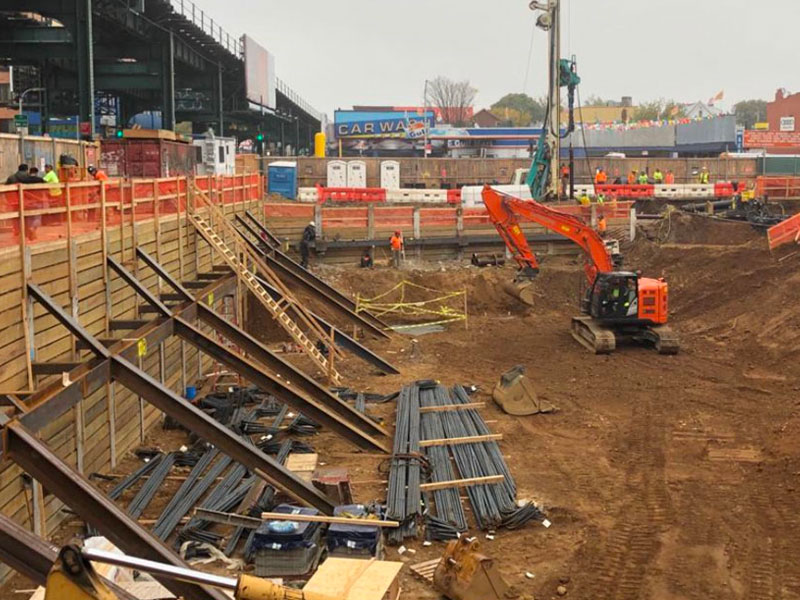Comprehensive Excavation Methods: Mastering the Fundamentals for Success
The mindful preparation, precise execution, and precise interest to information called for in excavation tasks require an extensive technique that includes different fundamental facets. The true proficiency lies not just in recognizing these fundamentals however in perfectly integrating them to navigate the intricacies of excavation jobs with skill.
Recognizing Excavation Project Planning

The first stage of any type of excavation project is the planning stage, where vital choices are made that can significantly affect the end result of the task. Recognizing the job scope, spending plan, and timeline restrictions is vital for creating a comprehensive excavation plan that guarantees the project's success.
One trick facet of excavation task preparation is the growth of an in-depth timeline that details the sequence of due dates, milestones, and activities. This timeline acts as a roadmap for the project group, permitting them to track progress and make needed modifications to guarantee the project remains on timetable. Furthermore, a well-defined budget that makes up all expenditures, consisting of devices leasing, labor expenses, and materials, is vital for avoiding price overruns and delays. By thoroughly taking into consideration all these elements during the drawing board, excavation jobs can be carried out efficiently and effectively, bring about effective outcomes.
Soil Analysis and Website Assessment
Performing comprehensive dirt evaluation and website assessment is an essential step in the preparation stage of any type of excavation task. Dirt analysis involves figuring out the make-up, framework, and homes of the dirt at the excavation website. This details is essential for comprehending the dirt's bearing ability, moisture content, and potential for disintegration, which are vital factors in identifying the excavation methods and tools required for the task.
Website evaluation surpasses soil analysis and encompasses a broader evaluation of the general site conditions. This assessment includes recognizing any possible risks, such as underground utilities, ecological concerns, or unsteady surface, that might affect the excavation process. By thoroughly examining the website, task supervisors can develop reliable excavation approaches that prioritize safety, performance, and environmental management.
Utilizing sophisticated innovations like ground-penetrating radar, soil sampling, and drone studies can boost the precision and performance of soil evaluation and site examination. Spending time and sources in these preliminary steps can inevitably save time and protect against costly delays or issues throughout the excavation procedure.
Equipment Choice and Usage
Effective excavation projects count heavily on critical equipment option and use to ensure optimal performance and performance. Picking the appropriate equipment for the task is essential in making the most of performance and decreasing downtime. Factors such as the kind of soil, deepness of excavation, and task extent play a significant duty in identifying one of the most ideal tools for the job handy.

In addition to picking the proper equipment, proper utilization is vital to task success. Operators has to be educated to take care of the devices safely and successfully - septic ohio. Normal maintenance checks and timely repairs assist stop malfunctions and guarantee consistent click over here performance throughout the job
Precaution and Rules Conformity
In the realm of excavation tasks, focusing on safety and security measures and conformity with guidelines is critical to ensuring a secure and legitimately audio functional setting. Precaution include a variety of methods, consisting of conducting extensive site assessments, executing correct signage and obstacles, and supplying sufficient safety and security training for all employees associated with the excavation procedure. Adherence to laws, such as OSHA demands in the United States, guarantees that the excavation project fulfills the essential criteria to secure workers, bystanders, and the surrounding atmosphere.

Tracking Progress and Adjusting Approaches
How can forecast supervisors properly track the development of excavation jobs and adapt their methods appropriately to optimize outcomes? Surveillance progression is necessary for making sure that excavation projects remain on track and meet target dates.

Final Thought
Finally, mastering the basics of detailed excavation approaches is important for the success of any kind of job. By understanding task planning, assessing soil and website problems, selecting ideal equipment, conforming with safety regulations, and checking progress, task supervisors can guarantee a smooth and effective excavation process. Implementing these approaches will certainly result in successful end results and minimize potential dangers or troubles throughout the excavation task.
The preliminary stage of any type of excavation job is the planning phase, where vital decisions are made that can significantly affect the outcome of the job. Understanding the project scope, budget, and timeline restraints is crucial for producing a detailed excavation plan that makes certain the task's success.
Exactly how can project managers effectively track the innovation of excavation projects and adapt their strategies accordingly to maximize view publisher site outcomes? By carefully monitoring progression and being eager to adapt strategies, task managers can enhance the overall success of excavation tasks.
By understanding project planning, analyzing dirt and website conditions, choosing ideal equipment, complying with security laws, and checking progress, project managers can make sure a smooth and reliable excavation process.